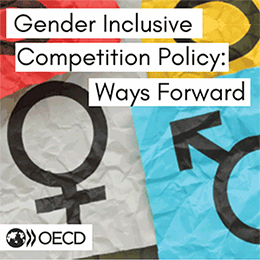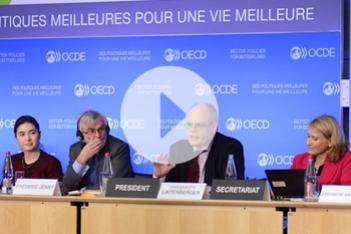Competition
Gender inclusive competition policy
|
The fight for gender equality is one of the defining challenges of our age. While progress has been made in many areas, the relationship between gender and competition policy remains largely unexplored. Competition policy usually thinks in terms of consumers and firms, government and regulators. Traditionally, consumers have been considered only by their willingness to pay, their (rational) preferences, their ability to substitute between products offered by firms. Meanwhile, firms are treated as entities that are defined by the profit-maximising objectives of their owners, and only rarely seen as collections of people. Competition policy is therefore largely gender blind and prides itself on its objectivity. However, in 2018, the OECD began to explore whether a gender lens might in fact help deliver a more effective competition policy by identifying additional relevant features of the market, and of the behaviour of consumers and firms, as well as whether a more effective competition policy can help address gender inequality. The OECD Gender Inclusive Competition Policy project has been launched with the support of the Canadian Government and in particular the Canadian Competition Bureau to develop guidance for competition agencies in this area. |
|
|
What changes can competition agencies and policy makers make in order to build a gender inclusive competition policy? The OECD has now selected seven projects that will generate new evidence to inform the debate and help develop guidance on how to develop a more gender inclusive competition policy. The research will feed into the OECD's development of a practical toolkit for the Canadian Competition Bureau and other competition authorities who are interested in building a gender inclusive competition policy. An online workshop on Gender Inclusive Competition Policy took place on 25 February 2021, a briefing meeting on 30 March 2021 and on 7 October 2021, all seven selected projects were presented during an online conference open to all.
Learn more about the seven selected projects
Learn about the other proposals not selected for this project
|
|
|
Seven projects were selected to generate new evidence and inform the debate on how to develop a more gender inclusive competition policy. Read the final research papers submitted by the different project teams that were presented on 7 October 2021 during our online public event. Paper #1 Gender differences in surveys for market definition and merger analysis l Presentation with key findings Paper #2 Gender considerations in the analysis of market definition and competitive effects: A practical framework and illustrative example l Presentation with key findings Paper #3 Cartel behaviour and boys’ club dynamics: French cartel practice through a gender lens l Presentation with key findings Paper #4 Gender bias in cartel engagement l Presentation with key findings Paper #5 Gender and collusion l Presentation with key findings Paper #6 Prioritising gendered public interest considerations l Presentation with key findings Paper #7 Incorporating Gender as a Prioritization Principle and Project Selection Criterion in Competition Agencies l Presentation with key findings |
|
|
07/10/2021 - GENDER INCLUSIVE COMPETITION POLICY PROJECT: WAYS FORWARD 30/03/2021 - PROJECT UPDATE BRIEFING MEETING 25/02/2021 - WORKSHOP ON GENDER INCLUSIVE COMPETITION POLICY See the presentations of the proposals Project #1: Gender in Market Analysis: an Ex Post Review of Consumer Survey EvidenceProject #2: Approaches to Incorporating Gender Considerations into Product Market Definitions and Analysis of Competitive Effects Project #3: Cartel Behaviour and Boys' Club Dynamics Project #4: Gender Bias in Cartel Engagement Project #5: Gender and Collusion Project #6: A Gender-Inclusive Competition Policy: Prioritising Gendered Public Interest Considerations Project #7: Incorporating Gender as a Prioritization Principle and Project Selection Criterion in Competition Agency Decisionmaking |
Watch the full conference (playlist) Watch by parts: Panel 1. Cartels and Collusion Part 3. Prioritisation and Public Interest Approach Also available: |
|
Contacts
For more information on this project or the call don't hesitate to write us at [email protected] or contact
|
Other links
|
Related Documents






